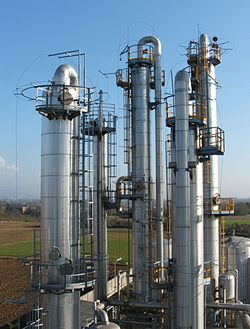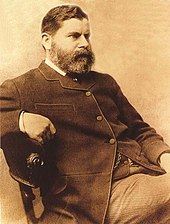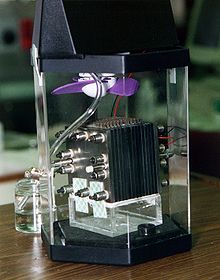Chemical engineering

Chemical engineering is an engineering field which deals with the study of operation and design of chemical plants as well as methods of improving production. Chemical engineers develop economical commercial processes to convert raw materials into useful products. Chemical engineering uses principles of chemistry, physics, mathematics, biology, and economics to efficiently use, produce, design, transport and transform energy and materials. The work of chemical engineers can range from the utilization of nanotechnology and nanomaterials in the laboratory to large-scale industrial processes that convert chemicals, raw materials, living cells, microorganisms, and energy into useful forms and products. Chemical engineers are involved in many aspects of plant design and operation, including safety and hazard assessments, process design and analysis, modeling, control engineering, chemical reaction engineering, nuclear engineering, biological engineering, construction specification, and operating instructions.
Chemical engineers typically hold a degree in Chemical Engineering or Process Engineering. Practicing engineers may have professional certification and be accredited members of a professional body. Such bodies include the Institution of Chemical Engineers (IChemE) or the American Institute of Chemical Engineers (AIChE). A degree in chemical engineering is directly linked with all of the other engineering disciplines, to various extents.
Etymology

A 1996 article cites James F. Donnelly for mentioning an 1839 reference to chemical engineering in relation to the production of sulfuric acid.[1] In the same paper, however, George E. Davis, an English consultant, was credited with having coined the term.[2] Davis also tried to found a Society of Chemical Engineering, but instead, it was named the Society of Chemical Industry (1881), with Davis as its first secretary.[3][4] The History of Science in United States: An Encyclopedia puts the use of the term around 1890.[5] "Chemical engineering", describing the use of mechanical equipment in the chemical industry, became common vocabulary in England after 1850.[6] By 1910, the profession, "chemical engineer," was already in common use in Britain and the United States.[7]
History
New concepts and innovations

In the 1940s, it became clear that unit operations alone were insufficient in developing
Safety and hazard developments
Concerns regarding large-scale chemical manufacturing facilities' safety and environmental impact were also raised during this period.
Recent progress
Advancements in
Concepts
| Part of a series on |
| Chemical engineering |
|---|
| Fundamentals |
| Unit processes |
| Aspects |
| Glossaries |
|
|
Chemical engineering involves the application of several principles. Key concepts are presented below.
Plant design and construction
Chemical engineering design concerns the creation of plans, specifications, and economic analyses for pilot plants, new plants, or plant modifications. Design engineers often work in a consulting role, designing plants to meet clients' needs. Design is limited by several factors, including funding, government regulations, and safety standards. These constraints dictate a plant's choice of process, materials, and equipment.[23]
Plant construction is coordinated by
Process design and analysis
A unit operation is a physical step in an individual chemical engineering process. Unit operations (such as
Process design requires the definition of equipment types and sizes as well as how they are connected and the materials of construction. Details are often printed on a
Education for chemical engineers in the first college degree 3 or 4 years of study stresses the principles and practices of process design. The same skills are used in existing chemical plants to evaluate the efficiency and make recommendations for improvements.
Transport phenomena
Modeling and analysis of transport phenomena is essential for many industrial applications. Transport phenomena involve
Applications and practice

Chemical engineers "develop economic ways of using materials and energy".[30] Chemical engineers use chemistry and engineering to turn raw materials into usable products, such as medicine, petrochemicals, and plastics on a large-scale, industrial setting. They are also involved in waste management and research.[31][32] Both applied and research facets could make extensive use of computers.[29]
Chemical engineers may be involved in industry or university research where they are tasked with designing and performing experiments, by scaling up theoretical chemical reactions, to create better and safer methods for production, pollution control, and resource conservation. They may be involved in designing and constructing plants as a
See also
Related topics
Related fields and concepts
- Biochemical engineering
- Bioinformatics
- Biological engineering
- Biomedical engineering
- Biomolecular engineering
- Bioprocess engineering
- Biotechnology
- Biotechnology engineering
- Catalysts
- Ceramics
- Chemical process modeling
- Chemical reactor
- Chemical technologist
- Chemical weapons
- Cheminformatics
- Computational fluid dynamics
- Corrosion engineering
- Cost estimation
- Earthquake engineering
- Electrochemistry
- Electrochemical engineering
- Environmental engineering
- Fischer Tropsch synthesis
- Fluid dynamics
- Food engineering
- Fuel cell
- Gasification
- Heat transfer
- Industrial catalysts
- Industrial chemistry
- Industrial gas
- Mass transfer
- Materials science
- Metallurgy
- Microfluidics
- Mineral processing
- Molecular engineering
- Nanotechnology
- Natural environment
- Natural gas processing
- Nuclear reprocessing
- Oil exploration
- Oil refinery
- Paper engineering
- Petroleum engineering
- Pharmaceutical engineering
- Plastics engineering
- Polymers
- Process control
- Process design
- Process development
- Process engineering
- Process miniaturization
- Process safety
- Semiconductor device fabrication
- separation of mixture)
- Crystallization processes
- Distillation processes
- Membrane processes
- Syngas production
- Textile engineering
- Thermodynamics
- Transport phenomena
- Unit operations
- Water technology
Associations
References
- ^ Cohen 1996, p. 172.
- ^ Cohen 1996, p. 174.
- ^ Swindin, N. (1953). "George E. Davis memorial lecture". Transactions of the Institution of Chemical Engineers. 31.
- ^ Flavell-While, Claudia (2012). "Chemical Engineers Who Changed the World: Meet the Daddy" (PDF). The Chemical Engineer. 52-54. Archived from the original (PDF) on 28 October 2016. Retrieved 27 October 2016.
- ^ Reynolds 2001, p. 176.
- ^ Cohen 1996, p. 186.
- ^ Perkins 2003, p. 20.
- ^ Cohen 1996, p. 185.
- ^ Ogawa 2007, p. 2.
- ^ Perkins 2003, p. 29.
- ^ Perkins 2003, p. 30.
- ^ Perkins 2003, p. 31.
- ^ Reynolds 2001, p. 177.
- ^ Perkins 2003, pp. 32–33.
- ^ Kim 2002, p. 7S.
- S2CID 4429741.
- ^ Bennet, Simon (September 1, 1999). "Disasters as Heuristics? A Case Study". Australian Journal of Emergency Management. 14 (3): 32.
- ^ Kim 2002, p. 8S.
- ^ Perkins 2003, p. 35.
- ISBN 978-1-118-94950-4.
- ^ Kim 2002, p. 9S.
- ^ American Institute of Chemical Engineers 2003a.
- ^ Towler & Sinnott 2008, pp. 2–3.
- ^ Herbst, Andrew; Hans Verwijs (Oct. 19-22).
"Project Engineering: Interdisciplinary Coordination and Overall Engineering Quality Control". Proc. of the Annual IAC conference of the American Society for Engineering Management 1 (ISBN 9781618393616): 15–21
- ^ "What Do Chemical Engineers Do?". Archived from the original on 2014-05-02. Retrieved 2015-08-23.
- ^ McCabe, Smith & Hariott 1993, p. 4.
- ^ Silla 2003, pp. 8–9.
- ^ Bird, Stewart & Lightfoot 2002, pp. 1–2.
- ^ a b Garner 2003, pp. 47–48.
- ^ American Institute of Chemical Engineers 2003, Article III.
- S2CID 195424881.
- ISSN 0926-3373.
- ^ Garner 2003, pp. 49–50.
Bibliography
- American Institute of Chemical Engineers (2003-01-17), AIChE Constitution, archived from the original on 2011-08-13, retrieved 2011-08-13.
- Bird, R. Byron; Stewart, Warren E.; Lightfoot, Edwin N. (2002), Kulek, Petrina (ed.), LCC QA929.B% 2001.
- Carberry, James J. (2001-07-24), Chemical and Catalytic Reaction Engineering, McGraw-Hill Chemical Engineering Series, Canada: General Publishing Company, LCC TP155.7.C37 2001.
- Cohen, Clive (June 1996), "The Early History of Chemical Engineering: A Reassessment" (PDF), S2CID 145005140, archived from the original(PDF) on 2012-06-01.
- Engineering the Future of Biology and Biotechnology, Rice University, archived from the original on 2010-07-25, retrieved 2011-08-07.
- Garner, Geraldine O. (2003), Careers in engineering, VGM Professional Career Series (2nd ed.), United States: McGraw-Hill, LCC TA157.G3267 2002.
- Kim, Irene (January 2002), "Chemical engineering: A rich and diverse history" (PDF), Chemical Engineering Progress, 98 (1), Philadelphia: American Institute of Chemical Engineers, ISSN 0360-7275, archived from the original(PDF) on 2004-08-21.
- McCabe, Warren L.; Smith, Julian C.; Hariott, Peter (1993), Clark, B.J.; Castellano, Eleanor (eds.), Unit Operations of Chemical Engineering, McGraw-Hill Chemical Engineering Series (5th ed.), Singapore: McGraw-Hill, .
- Ogawa, Kōhei (2007), "Chapter 1: Information Entropy", Chemical engineering: a new perspective (1st ed.), Netherlands: Elsevier, ISBN 978-0-444-53096-7.
- Perkins, J.D. (2003), "Chapter 2: Chemical Engineering — the First 100 Years", in Darton, R.C.; Prince, R.G.H.; Wood, D.G. (eds.), Chemical Engineering: Visions of the World (1st ed.), Netherlands: Elsevier Science, ISBN 0-444-51309-4.
- Reynolds, Terry S. (2001), "Engineering, Chemical", in Rothenberg, Marc (ed.), History of Science in United States: An Encyclopedia, New York City: Garland Publishing, LCC Q127.U6 H57 2000.
- Silla, Harry (2003), Chemical Process Engineering: Design and Economics, New York City: Marcel Dekker, ISBN 0-8247-4274-5.
- American Institute of Chemical Engineers (2003a), "Speeding up the human genome project" (PDF), Chemical Engineering Progress, 99 (1), Philadelphia, ISSN 0360-7275, archived from the original(PDF) on 2004-08-21.
- Towler, Gavin; Sinnott, Ray (2008), Chemical engineering design: principles, practice and economics of plant and process design, United States: Elsevier, ISBN 978-0-7506-8423-1.



